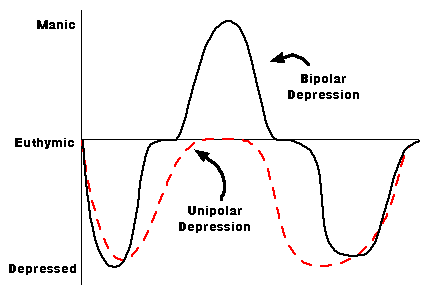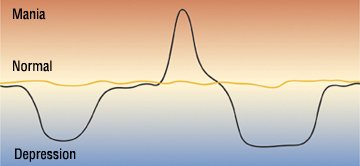Bipolar Affective Disorder (BPAD)
Bipolar Affective Disorder (BPAD) - Manic-Depressive Disorder (MDD) - Major Depression - Mania
Everyone has ups and downs in mood. Sometimes you may bubble with energy and good spirits, with everything being a lot of fun and healthy positive outlook on life. Other times you feel ‘off mood’, when things are not particularly enjoyable and everything seems to be going wrong. Changes in mood are so much a part of life, that we sometimes fail to recognize when they are abnormal.
Bipolar Affective Disorder (Manic-Depressive Disorder / Manic Depression) — causes mood swings which take the form of depression or mania that last for several months at a time. Causes include biochemical imbalance in the brain. Treatment includes medicines like anti depressants, and mood stabilizers.
When depressed the person has great sadness, guilt, no appetite, poor sleep and is unable to experience any enjoyment. During mania the person experiences extreme elation and has erratic and excited behavior. A less extreme form of mania is termed hypomania with similar but less intense symptoms. Some patients may also have “mixed” episode with symptoms of both mania and depression episode for a short period of time. Mood shifts may occur just once or a few times a year.

Bipolar disorder is divided into several subtypes.
- Bipolar I disorder. Very high manic periods and depressive episodes.
- Bipolar II disorder. Severe depressions but only mild manic (hypomanic) episodes.
- Cyclothymia. Mild depression and Mild mania.
- Rapid Cycling. Switches from short period of depression to short period of mania at least 4 times a year.
Manic depressive psychosis is an inherited problem. The reasons for this illness exist in the genetic make up of the person. Often, more than one person in a family will have the same problem but this is not necessary – the tendency to develop the disease can be there without it actually happening. It is a matter of body chemistry and internal biological clock. Psychological stress can act as a trigger for the problem or can make the symptoms worse. Sometimes there is seasonal variation or circumstances after repeated episodes could percipitate future episodes. Alcohol and drugs are known to percipitate attacks, specially of depression. Similarly some physical illnesses or medicines may also percipitate an episode.
Several factors seem to be involved in causing and triggering bipolar episodes:
- Genetic. Bipolar disorder runs in families
- Biological. People with bipolar disorder appear to have physical changes in their brains. An imbalance in naturally occurring brain chemicals causes the mood changes
- Hormones. Imbalanced hormones may trigger the mood changes. .
- Environment. Stress, abuse, significant loss or other traumatic experiences may trigger a bipolar disorder.
Bipolar disorder requires lifelong treatment, even during periods when you feel better. There are several categories of treatment. There is different treatment for manic episodes, depressive episodes and rapid cycling. Apart for these treatments to stop episodes of depression and mania there is also long term maintenance therapy.The primary treatments for include medications; individual, or family psychological counseling (psychotherapy); or education.
- Initial treatment generally involves taking medications to balance the moods right away.
- Continued treatment (maintenance treatment) is used once the symptoms have subsided. People who skip maintenance treatment are at high risk of a relapse of symptoms or having minor mood changes turn into full-blown mania or depression.
- Hospitalization may be needed dangerous or disruptive, suicidal or psychotic behavior.
Precautions :— The episodes once started do not usually go away on their own and before the episode is over, violence to others or self; total breakdown of work, social support and family are real dangers.
The treatment is to be started immediately and person helped/restrained from making any long term mistakes. The family also must not make the patient a focus of attention and should try and network with other familiar to ensure learning from each other as well as give support.

Symptoms of Mania:
- Feeling high, everything seems wonderful
- Fast flow of ideas
- Talking too much, too loud
- Never sticking to a topic and jumping from topic to topic without any reason
- Distracted easily
- Highly energetic and active compared with usual
- Sudden increase in religious feeling
- Feeling that one is great or special
- Spending a lot of money without any reason
- Extra energetic, never keeping still
- Extreme optimism
- Inflated self-esteem
- Rapid speech
- Racing thoughts
- Aggressive behavior
- Agitation or irritation
- Increased physical activity
- Risky behavior
- Increased drive to perform or achieve goals
- Increased sex drive
- Decreased need for sleep
- Delusions or a break from reality (psychosis)
Symptoms of Depression
- Sadness
- Hopelessness
- Crying spells
- Suicidal thoughts or behavior
- Guilt
- Self blame
- Sleep problems
- Low appetite or increased appetite
- Fatigue
- Loss of interest in daily activities
- Problems concentrating
- Poor performance at work or school
- Withdrawal from social activities
- Reduced emotional response
- Slower mental functional than usual
In addition, suicide is a very real possibility in depression. So, one should be alert for·any signs of suicidal thoughts or intentions.
Symptoms in children and adolescents:
Instead of clear-cut depression and mania or hypomania, the most prominent signs of bipolar disorder in children and adolescents can include explosive temper, rapid mood shifts, reckless behavior and aggression. In some cases, these shifts occur within hours or less — for example, a child may have intense periods of silliness, long bouts of crying and outbursts of explosive anger all in one day. Changing sleep patterns are also a common indicator of childhood bipolar disorder.
Medication works best for Manic depressive psychosis. The treatment, which must be taken regularly and for a long period of time, controls the episodes with a high rate of success. When the problem is especially severe, the person may have to be hospitalized until he or she is behaving normally again.
Work therapy and exercises :— During an episode of depression, the person may lose confidence of being able to do anything in future and feeling in control through work helps the person feel better. Mixing with people and engaging in social activities also plays an important part. Exercise builds up certain chemicals which have anti depression activity. Work, exercise and social interaction works off some excess energy in manic episodes but one must ensure that this does not further stimulate the excitement.
Counseling:— The person recovering from a mood disorder may need help with getting his or her life back together. Advice may be needed on how to handle stress situations and on how to get back to’ living as normal a life as possible.
Prevention :— It is possible to control the future episodes of Mania or Depression if the episodes are:— Frequent, Occurring very rapidly, Switches from Depression to Mania very fast without periods of normalcy, Increasing in number, Lasting for prolonged periods and very severe.
